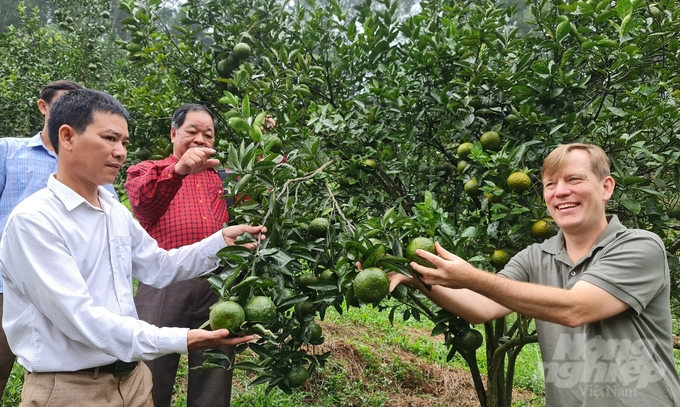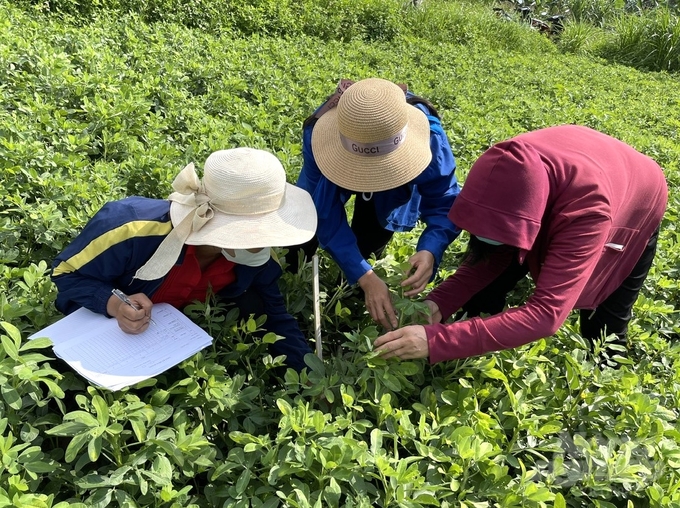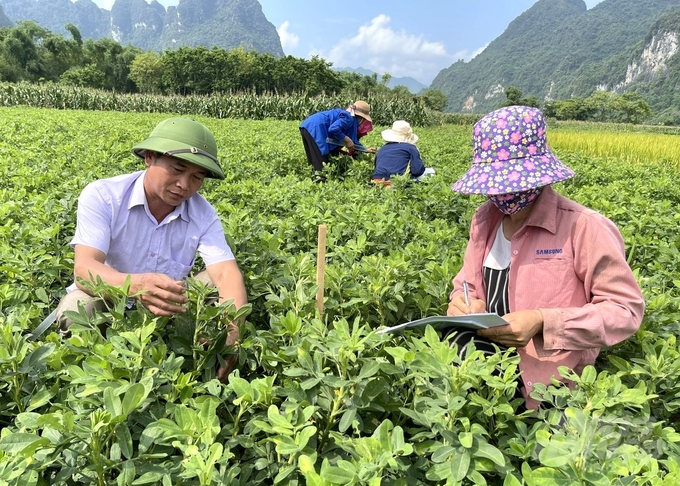May 24, 2025 | 16:28 GMT +7
May 24, 2025 | 16:28 GMT +7
Hotline: 0913.378.918
May 24, 2025 | 16:28 GMT +7
Hotline: 0913.378.918

Developing organic agriculture is an important premise for increasing plant health. Photo: Dao Thanh.
Implementing the integrated pest management (IPM) program on key crops, since 2021 Tuyen Quang province has organized 14 IPM training courses with the participation of 380 farmers, built 14 IPM models on rice, corn, vegetables, oranges, grapefruit, and tea, totaling an area of 61 ha.
According to Tran Hai Tuyen, Head of Tuyen Quang Department of Crop Production and Plant Protection, after 3 years of implementation, the plants under the IPM models have grown well and have their resistance to adverse conditions increased.
Farmers reduce the frequency of spraying pesticides by 1 - 2 times, reduce the amount of chemical fertilizers by 5 - 10%, and reduce production costs by 5 - 10%. Productivity is increased by 10 - 15% compared to the period before model application, the quality of agricultural products shows signs of improvement, hence an increase in production efficiency.
A prime example is the integrated pest management model on tea deployed in Lung village, My Bang commune, Yen Son district in 2023 with an area of 3 ha and 5 households participating. Nguyen Thi Tuyen's family in Lung village, My Bang commune joined the model with 7,000 m2 of farm land. “Thanks to training courses, the local people no longer use herbicide during the cultivation process, but instead use machines or manually cut weeds between tea rows and around the edges of tea gardens, creating an environment for beneficial insects to live,” she said.

Organic tea areas established in Tuyen Quang help the environment become increasingly clean. The soil is full of vitality, and so are the farmers. Photo: Dao Thanh.
Now households trained in IPM methods like Tuyen know how to evaluate the growth and development of tea gardens such as height, diameter of tea canopy, bud-forming periods as well as the situation of pests, diseases, weeds, and weather conditions to apply appropriate technical measures to their garden. The results of economic accounting show that gardens applying IPM have lowered production costs, especially the cost of pesticides, while giving higher profits than gardens following conventional farming practices by VND 7,150,000/ha.
Tuyen Quang identifies oranges, tea, grapefruit and peanuts as key crops in terms of agroproduction. The province currently has nearly 8,200 ha of tea, over 6,400 ha of orange, 5,200 ha of grapefruit and 3,100 ha of peanut. The crops are oriented to apply IPM, and organic production will be the number one priority in order to expand the consumption market. Based on IPM, Tuyen Quang is also launching an integrated plant health management (IPHM) program, aiming toward sustainability.

The peanut model applying IPHM is implemented from February to May 2024 in Ban Puoc village, Tho Binh commune, Lam Binh district with a total area of 2 ha. Photo: Dao Thanh.
The model on peanuts applies IPHM, implemented from February to May 2024 in Ban Puoc village, Tho Binh commune (Lam Binh district). It has 29 participating households with a total area of 2 ha. As a key crop, peanuts have been a stable source of income for many years for the local people.
Although farmers in Tho Binh previously limited the use of pesticides on peanuts, the care process was not well understood. Thanks to participating in the model, farmers are able to learn about ecosystem analysis and investigation methods, production diary, soil improvement measures, fertilizer utilization, and how to create an ideal living environment for beneficial nemesis of pests.
Ma Thi Moi's family in Ban Puoc village planted 2,000 m2 of peanuts this year. Participating in the IPHM model, Moi was instructed on cultivation, care, and fertilization methods according to the nutritional needs of the plant through each stage of growth. Thanks to the acquired knowledge, the soil in her family's peanut field is becoming more and more porous.
This year's crop is a bumper crop for Moi’s family, with an estimated yield of 3.2 tons/ha, much higher than previous years. With the current purchase price of fresh peanuts ranging from VND 12,000 to 14,000/kg, this year's peanut crop earned her family nearly VND 9 million.

Farmers participating in the IPHM model in Tuyen Quang have learned how to fertilize plants in a balanced way, taking their nutritional needs into consideration. Photo: Dao Thanh.
Bui Quang Trung, Km68 village, Yen Lam commune, Ham Yen district, said that his family has 3 ha of orange. In previous years, he used chemical fertilizers and pesticides in an uncontrolled manner, so the soil became increasingly poor. The orange garden developed many diseases, and the trees quickly grew weak. After experiencing the IPHM model, he now knows how to weed, fertilize, prune branches, protect the nemesis of pests, and recognize the main diseases to prevent and control them. His garden becomes healthy and green again. Taking a step further, Trung actively promotes local orange producers to apply this model.
Translated by Samuel Pham

(VAN) In the tranquil wetlands of Van Long, there are quiet souls who guard the forests, nurture the waters, and oversee every bird and troop of langurs as protecting the essence of a living heritage.

(VAN) WWF, GIZ, IUCN, UNDP call for biodiversity conservation and sustainable development must be regarded as a unity in strategies for a green future.

(VAN) On celebration of International Day for Biological Diversity, Deputy Minister Nguyen Quoc Tri called for practical actions to address nature and biodiversity conservation.

(VAN) Dr. Hoang Thi Thanh Nhan – Deputy Director of the Nature and Biodiversity Conservation Agency – highlighted this on the International Day for Biological Diversity, May 22, 2025.
![Ho Chi Minh city adapts to climate change: [2] Accelerating action](https://t.ex-cdn.com/nongnghiepmoitruong.vn/608w/files/chiqk/2025/05/22/4024-4220-bien-doi-khi-hau-1-100626_766.jpg)
(VAN) Clearly recognizing the challenges posed by climate change, Ho Chi Minh city has swiftly shaped its policies and implemented practical solutions to adapt.

(VAN) Rice straw is no longer just a discarded byproduct, but it is becoming a green resource that helps farmers in the Mekong Delta reduce emissions and promote circular, sustainable agriculture.

(VAN) Other Effective Area-based Conservation Measures (OECMs) are solutions that contribute effectively to achieving the goals of the Kunming–Montreal Global Biodiversity Framework.